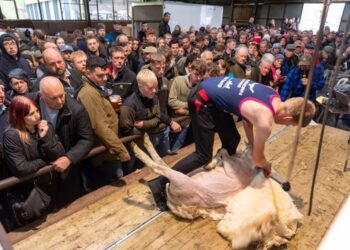
Ambitious plans for the restoration to a natural state of the RSPB reserve at Geltsdale, in the North Pennines, were unveiled on Monday.
The plans are intended to create a “Pennines Paradise” and will involve moorland restoration, woodland expansion, wetland creation and hay meadow regeneration to support species such as hen harriers, black grouse and otters.
New conservation efforts will also combat climate change by locking away carbon, slow the flow of water to reduce flooding and enhance biodiversity.
More than 11km of fencing has already been removed, with more planned, to allow wildlife to roam freely, while grazing cattle will help shape vibrant habitats for ground nesting birds. Water voles, white-faced darter dragonflies and bog myrtle are to be re-introduced and ospreys will be encouraged to re-colonise naturally.
The unveiling of the plans followed the purchase last November of the remaining third of land at RSPB Geltsdale. The charity says that with this expansion the reserve’s moorlands, wetlands and woodlands can be fully restored and protected.
Reserve manager Ian Ryding said: “Our plans are ambitious and, in a nutshell, mean bringing this North Pennines landscape fully back to life. We’ve already achieved so much over the last 30 years but now, with the purchase of the remaining land, we can do so much more. It will be such a thrill to see the amazing golden eagle re-colonising England in the near future and the pinnacle of success for me would be seeing them soaring across the moorlands of Geltsdale.”
Already 110,000 native trees have been planted at Geltsdale, nature-friendly farming with tenant farmers has helped bring back the call of the curlew, peatlands have been restored and Howgill Beck has been re-wiggled. In 2024 eight hen harrier chicks fledged from two nests — the highest number for 20 years.
Ian added. “Conservation efforts over the last three decades are clearly paying off but now we are stepping up a gear to realise our bold new vision for the reserve.”
Over the next five years, the RSPB plans to take actions including planting thousands of native trees such as aspen, downy birch and rowan; installing dams to stabilise and rejuvenate peatlands; creating new wetlands and reed beds to nurture wildlife; re-wiggle the upstream section of Howgill Beck; and re-introduce white-faced darter dragonflies and water voles.
The first phase of work begins this winter with tree planting, wetland restoration and peatland surveys. Over the coming months, local communities and visitors will see new life emerging across the reserve, while plans are also under way to restore Howgill Cottages for volunteers and conservation teams working on site.
A new fundraising campaign to help turn this vision into a reality has been launched, with the public being urged to support this conservation work.
Anybody wanting to contribute to the appeal should visit www.rspb.org.uk/penninesparadise































